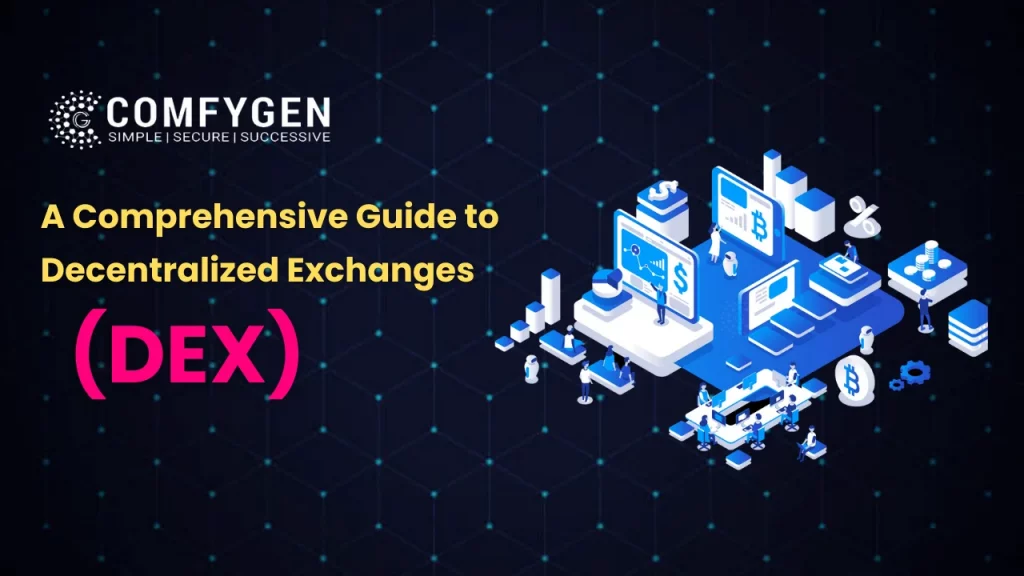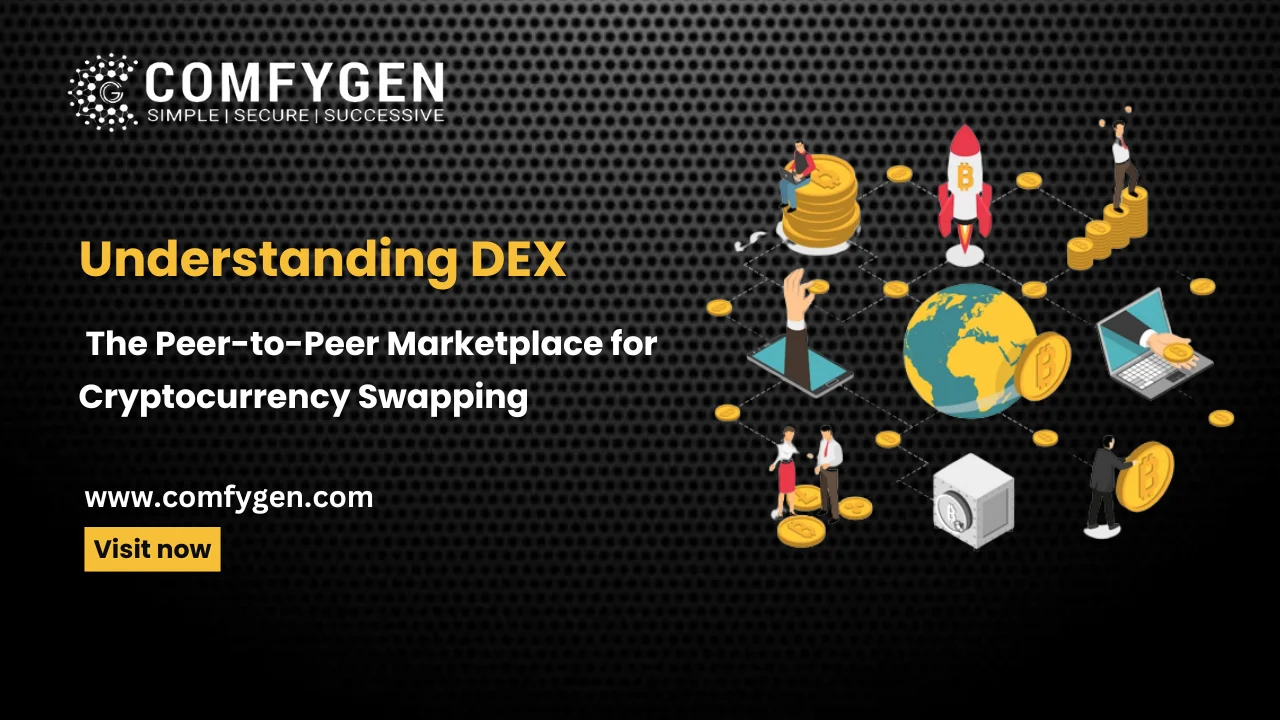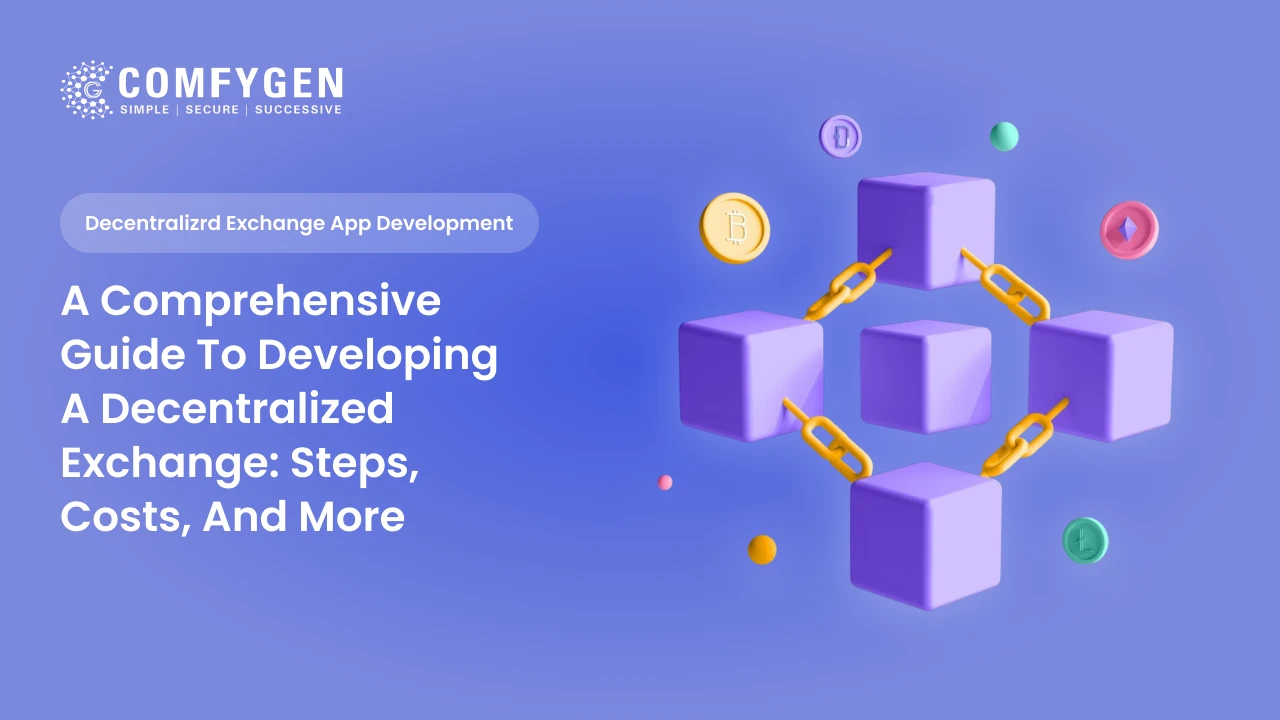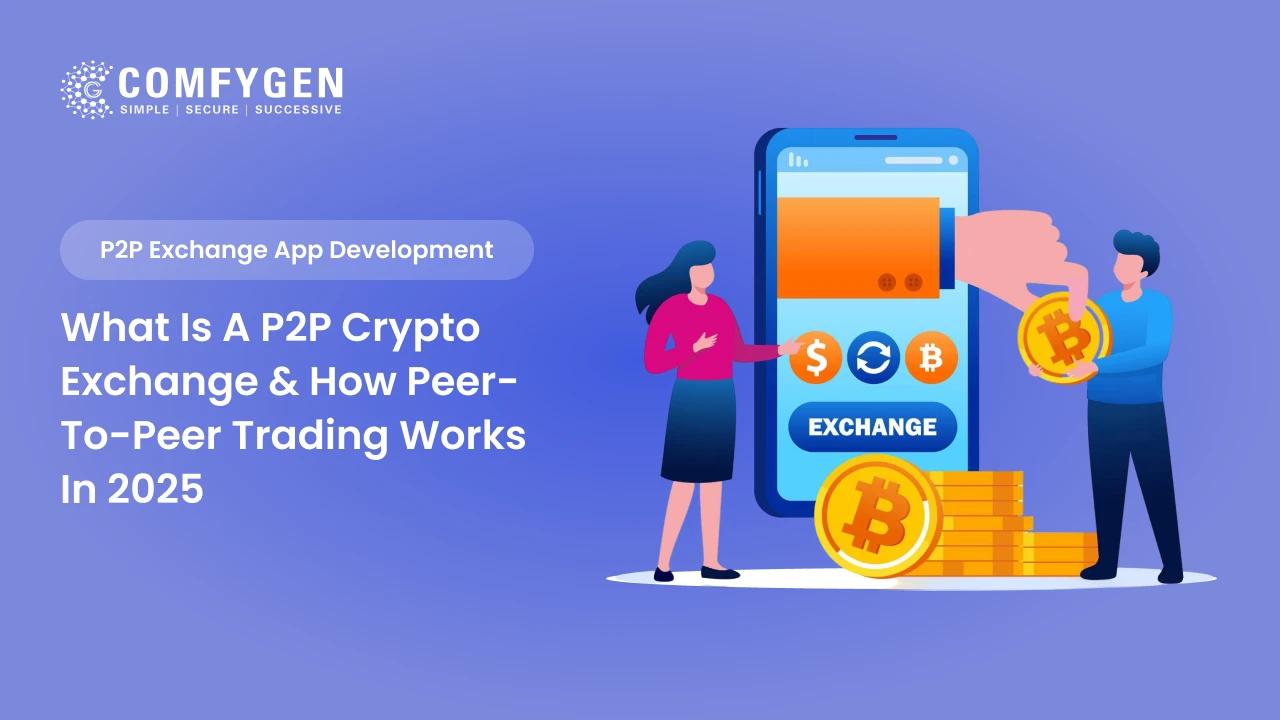Exploring Decentralized Exchange (DEX): The Future of Peer-to-Peer Cryptocurrency Trading

Decentralized exchange (DEX) is a peer-to-peer marketplace designed for cryptocurrency swapping, that eliminates mediators to increase security and privacy. DEXs allow users to trade directly from their wallets operating on blockchain technology, maintaining control over their funds. They offer benefits like reduced hacking risk, censorship resistance, and global accessibility with trades facilitated by automated smart contracts. Popular DEXs like Uniswap, PancakeSwap, and SushiSwap use liquidity pools for token swaps where users earn a portion of trading fees. DEX is compulsory to the DeFi ecosystem that authorizes users with greater autonomy, though they must be aware of potential risks and impermanent losses in liquidity provision.
DEX market cap stands at $23.17 billion reflecting a daily change of +0.17%. Now, volume often exceeds $2 billion as of early 2024. DEXs now represent 10-15% of total cryptocurrency trading volume. The total value locked (TVL) in DEX protocols has surpassed $20 billion. In this article, you will explore the whole guide of DEX its peer-to-peer Marketplace for cryptocurrency swapping. Let’s get started.
What is a DEX?
DEX also known as Decentralized Exchange is a peer-to-peer cryptocurrency marketplace where transactions take place directly between traders ending the need for intermediaries like banks or brokers. DEX using blockchain-based smart contracts and provides secure, transparent, and non-custodial trading that allows users to maintain control over their funds and reducing counterparty risk. Uniswap, PancakeSwap, and SushiSwap platforms use liquidity pools for token swaps that provides users opportunities to earn trading fees. DEX increases financial autonomy and transparency. Users must be aware of potential risks like liquidity provision and impermanent loss.
Full Information About: What is a DEX? How do Decentralized Exchanges Work?
How Does a DEX Work?
Decentralized exchange (DEX) is a peer-to-peer marketplace that connects cryptocurrency buyers and sellers without a mediator that operates on blockchain technology using smart contracts. Unlike centralized exchanges (CEXs), DEXs are non-custodial meaning users keep control of their private keys and funds throughout transactions.
Users connect their cryptocurrency wallets to the DEX to specify trade details and authorize transactions with their private keys. Smart contracts then execute the trades by interacting with liquidity pools or directly with other users which ensures security and decentralized control.
DEXs use automated market makers or order books to determine prices and match orders that provide a secure, private, and autonomous trading environment, though they may face challenges like lower liquidity and higher transaction costs during network blockage.
Underlying Technology And Processes of DEX
At the heart of a DEX lies a blockchain development services, or distributed ledger system, such as Ethereum Blockchain. Smart contracts are pivotal components of DEX functionality. Smart contracts are self-executing code that automatically executes transactions when predefined conditions are met. In the context of a DEX, these contracts regulate the processes of trading and fund management.
- Liquidity Pools: In DEXs, users do not directly trade with one another. Instead, they trade against liquidity pools. Users contribute to these pools by depositing pairs of tokens they wish to trade. The ratio of tokens determines the price.
- Order Matching: Unlike centralized exchanges that rely on order books to match buyers and sellers, DEXs employ various algorithms and mechanisms to facilitate trades. Automated Market Makers (AMMs) are commonly used, where trades are executed based on the predefined token ratios in liquidity pools.
- Atomic Swaps: DEXs often utilize atomic swaps, a technology that enables direct trades between different cryptocurrencies without the need for an intermediary. This ensures that either both parties receive their desired assets, or the trade doesn’t occur at all.
- User Wallets: Users retain control of their funds by connecting their wallets (like MetaMask) to the DEX interface. This allows them to directly interact with smart contracts and execute trades without relinquishing custody of their assets.
- Security Measures: DEXs prioritize security by UI/UX design. They mitigate risks associated with centralized exchanges, like single points of failure and susceptibility to hacks. User funds are less likely to be compromised since they remain in their wallets until the precise moment of trade execution.
The Importance of Understanding DEXs for Cryptocurrency Swapping
Gaining a comprehensive understanding of DEXs is essential for anyone involved in the cryptocurrency space, whether as a trader, investor, or DeFi enthusiast. Several reasons highlight the importance of this knowledge:
- Security and Control: DEXs prioritize user control and security. By facilitating direct wallet-to-wallet transactions, users retain ownership of their private keys and funds, reducing the risk of hacks and breaches often associated with centralized exchanges.
- Privacy: DEXs often don’t require users to complete KYC (Know Your Customer) procedures, preserving their privacy. This is in contrast to centralized exchanges that necessitate personal information, leaving users vulnerable to data leaks and privacy breaches.
- Censorship Resistance: Since DEXs operate on decentralized networks, they are resistant to censorship. This is particularly important in regions with strict financial regulations, allowing users to trade freely without fear of platform shutdowns.
- Global Accessibility: DEXs are accessible to users worldwide, provided they have an internet connection and compatible Cryptocurrency Wallet. This inclusivity is important for enabling broader participation in the cryptocurrency economy.
- Empowerment and Financial Sovereignty: Understanding DEXs empowers individuals to take control of their financial activities. Users can engage in peer-to-peer trading without intermediaries, aligning with the core philosophy of cryptocurrencies.
- DeFi Engagement: DEXs are integral to the DeFi ecosystem. Understanding their mechanics is essential for participating in defi development company such as DeFi Lending Platform Development, defi yield farming development company, and token swapping.
- Risk Management: While DEXs offer numerous advantages, they are not without risks. Impermanent loss, where liquidity providers face temporary losses due to price fluctuations, is a concept that requires careful consideration.
- Token Diversity: DEXs enable the trading of a wide array of tokens, including those from newer projects. This diverse ecosystem can provide opportunities for discovering promising tokens before they hit mainstream exchanges.
Glance Here: How To Launch Your Own Cryptocurrency: Everything You Must Know
Types of Decentralized Exchanges (DEXs)
Decentralized Exchanges (DEXs) have revolutionized the way cryptocurrencies are traded by offering a decentralized and secure environment for users to exchange digital assets. Within the realm of DEXs, two prominent categories have emerged: Order book-based DEXs and Automated Market Maker (AMM) DEXs. Each type presents a unique approach to facilitating trade and addressing the challenges posed by traditional centralized exchanges. In this article, we will explore the characteristics and mechanics of these two types of DEXs.
- Order Book-Based DEXs:
Order book-based DEXs is a list that displays all the buy and sell orders for a particular trading pair, along with the corresponding prices and quantities. Users can place different types of orders, like market orders and limit orders. Market orders are executed immediately at the current market price, while limit orders are set at a specific price and are only executed when the market reaches that price. The DEX matches these orders based on price and time priority. Order books are of two types On-chain order books and off-chain order books.
- The on-chain order book records and manages all orders directly on the blockchain. Every order, modification, or cancellation is a blockchain transaction that provides transparency and security.
- The off-chain order book managed the order book outside the blockchain. This approach reduces latency and transaction costs because only the actual trades are recorded on the blockchain.
- The on-chain order book records and manages all orders directly on the blockchain. Every order, modification, or cancellation is a blockchain transaction that provides transparency and security.
- Automated Market Maker (AMM) DEXs
Automated Market Maker (AMM) DEXs take a fundamentally different approach to facilitating trades compared to order book-based DEXs. AMMs eliminate the need for an order book by using liquidity pools and algorithms to determine prices and execute trades. This approach is particularly well-suited for providing liquidity to trading pairs that might not have sufficient activity on order book-based platforms. In an AMM DEX, users provide liquidity by depositing pairs of tokens into a liquidity pool. These pools are used to execute trades, and participants earn a share of the trading fees as a reward for providing liquidity. The price of tokens within the pool is determined by a mathematical formula, often following the constant product formula (x * y = k), where x and y represent the quantities of two tokens in the pool and k is a constant.
When a user wants to trade, they interact with the liquidity pool rather than placing orders in an order book. The user’s trade will impact the token balances in the pool, causing the price to change according to the AMM formula. This means that larger trades can lead to more significant price slippage, especially in pools with lower liquidity.
AMM DEXs have gained popularity due to their user-friendly nature and ability to provide liquidity to a wide range of trading pairs. They also mitigate the issues of order book-based DEXs, such as low liquidity and front-running. However, AMM DEXs can be less suitable for large trades, as the price impact can be substantial in pools with limited liquidity. Additionally, the deterministic pricing algorithm can lead to impermanent losses for liquidity providers when the relative prices of the deposited tokens change significantly. - DEX aggregators
DEX aggregators are specialized platforms that streamline and optimize the process of trading across multiple decentralized exchanges (DEXs) by pooling liquidity from various sources. DEX aggregators allow users to access a broader range of liquidity and achieve more approving trading conditions than they might on a single DEX by utilizing algorithms to find the best prices and lowest slippage for a given trade. These platforms increase the trading experience by providing a unified interface that reduces transaction costs and improves execution speed. Some important examples of DEX aggregators include 1inch, Matcha, and Paraswap, which offer users the benefits of increased efficiency, better pricing, and reduced complexity in decentralized trading.
Benefits of Decentralized Exchanges (DEXs)
Decentralized Exchanges (DEXs) have emerged as a revolutionary concept within the realm of cryptocurrency trading and have gained significant traction due to their various benefits. DEXs offer a unique approach to trading digital assets by operating on a decentralized network, in contrast to traditional centralized exchanges that are controlled by a single entity. This article delves into three key advantages of DEXs: enhanced security and control over funds, reduction of reliance on intermediaries; and improved privacy and anonymity.
- Enhanced Security and Control over Funds
Security has always been a major concern in the cryptocurrency space, with centralized exchanges susceptible to hacking and unauthorized access. DEXs address this concern by leveraging the principles of decentralization and cryptographic technology. Unlike centralized exchanges that require users to deposit their funds into exchange-controlled wallets, DEXs allow users to retain control over their private keys and funds throughout the trading process.
In a DEX, users trade directly from their wallets, eliminating the need to transfer funds to an intermediary’s custody. This significantly reduces the risk of theft or loss due to exchange breaches. Centralized exchanges often become targets for hackers due to the large amounts of funds stored in their wallets. In contrast, DEXs distribute funds across the network, making it much harder for malicious actors to compromise the entire system. - Reduction of Reliance on Intermediaries
One of the fundamental principles of cryptocurrencies is to enable peer-to-peer transactions without the need for intermediaries such as banks or payment processors. Traditional centralized exchanges, while providing liquidity and ease of use, reintroduce intermediaries into the cryptocurrency trading ecosystem. DEXs uphold the original ethos of cryptocurrencies by facilitating direct transactions between users.
By removing intermediaries, DEXs reduce the associated fees and delays that can arise from third-party involvement. On centralized exchanges, users often encounter withdrawal and deposit fees, trading fees, and even fees for listing new tokens. DEX development company, however, have minimal fees, mainly limited to network transaction costs. This can lead to more cost-effective trading and a better allocation of resources for traders and investors. - Improved Privacy and Anonymity
Privacy and anonymity are paramount for many users in the cryptocurrency space. Traditional centralized exchanges often require users to undergo extensive verification processes, linking their personal identities to their trading activities. This compromises privacy and opens the door to potential data breaches and identity theft.
DEXs offer an alternative approach by allowing users to trade without revealing personal information. Trading on DEXs typically requires only a cryptocurrency wallet, which can be created and used without divulging personal details. This is particularly important for users who prioritize privacy or live in regions with strict financial regulations.
Additionally, the decentralized nature of DEXs makes it harder for external entities to monitor and track user transactions. In centralized exchanges, a single entity has access to a centralized database containing trading data, opening the possibility of surveillance. DEXs distribute data across the network, making it more challenging for any single entity to monitor trading activities comprehensively.
DEX Platforms
-
Uniswap
Uniswap is a DEX platform known for its simple user interface and efficient automated market maker model that enables users to trade a wide range of ERC-20 tokens directly from their wallet. -
SushiSwap
sushiswap is a community-driven DEX platform derived from Uniswap that provides additional features such as currency farming and governance tokens to incentivize participation in the liquidity system and ecosystem. -
Curve Finance
Curve Finance is optimized for low slippage and high leverage using special bonding curves making it a preferred platform for traders seeking stable currency swaps with the lowest fees. -
KyberSwap
Part of the Kyberswap network that provides instant token swaps with low slippage by leveraging a diverse network of currency providers to ensure competitive pricing for users. -
Balancer
The balancer is a versatile tool that allows users to create small liquidity pools with multiple assets and different weights, enabling dynamic trading opportunities and automated portfolio management. -
PancakeSwap
Working on the Binance Smart Chain, pancakeswap offers a familiar AMM experience with lower fees and longer trading times than the Ethereum Blockchain DEX attracts users looking for cost-effective trading options. -
Serum (built on Solana)
Serum Solana is built on the best-performing blockchain. Serum combines the liquidity of centralized exchanges with the trustworthiness of the DEX, providing a fast and scalable trading solution for users interested in centralized finance. -
1inch
1inch is a DEX aggregator that aggregates currency from different centralized exchanges to provide users with the best price and lowest slippage for their trades, improving performance and optimizing trading patterns. -
Raydium
A centralized trading platform built on the Raydium Solana blockchain, Raydium provides AMM and order-book based trading along with trading tools and a cross-chain bridge for unprecedented interoperability.
Read More: Multicurrency Wallet Development A Solution To Manage Multiple Digital Assets
Factors To Consider When Using DEX
Decentralized Exchanges (DEXs) have gained significant popularity in the world of cryptocurrency trading due to their inherent advantages, such as enhanced security and reduced reliance on intermediaries. However, like any financial platform, DEXs come with their own set of considerations and challenges that users need to be aware of. In this article, we will explore three crucial factors to consider when using DEXs: liquidity considerations and challenges, smart contract risks and security precautions, and transaction fees and network congestion.
Liquidity Considerations and Challenges
Liquidity is a critical aspect of any trading platform, and it becomes even more crucial in the context of DEXs. Liquidity refers to the availability of buyers and sellers in the market for a particular trading pair. High liquidity ensures that trades can be executed smoothly with minimal price slippage, while low liquidity can lead to significant price fluctuations during trades.
When using DEXs, it’s important to consider the liquidity of the trading pairs you are interested in. Some popular trading pairs might have high liquidity due to their popularity, while less popular pairs could suffer from low liquidity. Low liquidity can result in higher price slippage, where the executed price deviates significantly from the expected price.
Challenges arise when trading illiquid tokens or during periods of high volatility. In such scenarios, executing large trades could be difficult without causing a substantial price impact. Additionally, low liquidity can make it harder to enter or exit positions quickly, potentially affecting the overall trading experience.
Read More: Ethereum Development for Unlocking the Potential of Blockchain
Smart Contract Risks and Security Precautions
DEXs operate on the blockchain through smart contracts, which are self-executing contracts with the terms of the agreement directly written into code. While smart contracts offer transparency and automation, they are not immune to risks. Vulnerabilities in smart contract code can lead to security breaches and financial losses.
Users must exercise caution and conduct due diligence when interacting with smart contracts on DEXs. Here are some security precautions to consider:
- Audit and Reputation: Before using a DEX, research the project’s history, development team, and whether their smart contracts have undergone third-party security audits. Reputable DEXs often make their audit reports publicly available.
- Token Approval: Approving tokens for trading involves giving smart contracts permission to spend your tokens. Be cautious when approving tokens and ensure you understand the permissions you are granting.
- Trustworthy Interfaces: Use official DEX interfaces or well-known interfaces that have been reviewed by the community. Beware of phishing sites and ensure you’re using the correct URL.
- Limit Exposure: Only interact with smart contracts and approve tokens when you intend to trade. Minimize the time your tokens are exposed to potential risks.
- Hardware Wallets: Whenever possible, use hardware wallets for transactions to keep your private keys secure and away from potential online threats.
A Step-by-Step Guide For Executing a Swap Transaction
Here’s a step-by-step guide on how to execute a cryptocurrency swap on a DEX:
- Choose a DEX and Connect Your Wallet: Start by selecting a DEX that supports the tokens you want to swap. Common DEXs include Uniswap, SushiSwap, and PancakeSwap. Connect your cryptocurrency wallet (such as MetaMask) to the DEX platform.
- Select the Tokens: Choose the tokens you want to swap. For example, if you want to exchange Ethereum for a different token, select Ethereum as the “From” token and choose the desired token as the “To” token.
- Specify the Amount: Enter the amount of the “From” token you want to swap. The platform will show you an estimated amount of the “To” token you will receive based on the current pool ratio. Keep in mind that this is an estimate, and the actual amount may vary due to price slippage.
- Confirm the Transaction: Review the transaction details, including the estimated amount and the transaction fee. Confirm the transaction and approve the spending of the “From” token in your connected wallet. This approval is required to execute the swap.
- Execute the Swap: After the approval, confirm the swap transaction. The DEX platform will interact with the liquidity pool’s smart contract to initiate the swap. The transaction will be broadcast to the blockchain for processing.
- Wait for Confirmation: Depending on network congestion, the transaction may take some time to confirm. You can track its progress using the transaction hash provided by the DEX.
- Transaction Completion: Once the transaction is confirmed, the “To” tokens will be deposited into your wallet. The exact amount you receive might differ slightly due to price slippage and network fees.
Regulatory And Legal Considerations For Decentralized Exchanges (DEXs)
The decentralized nature of cryptocurrency trading has led to a complex regulatory landscape, with authorities around the world grappling to define and regulate various aspects of this emerging technology. Decentralized Exchanges (DEXs) are a significant component of this landscape, presenting both opportunities and challenges in terms of compliance. In this article, we will explore the current regulatory environment for DEXs and delve into the compliance considerations that users need to be aware of.
Current Regulatory Landscape for DEXs:
The regulatory status of DEXs varies widely from one jurisdiction to another. While some countries have embraced cryptocurrencies and blockchain technology, others have taken a cautious approach due to concerns about fraud, money laundering, and consumer protection. Here are some key points to consider regarding the regulatory landscape:
- Legal Classification: DEXs are often categorized as trading platforms, which can fall under existing financial regulations depending on their operations. The regulatory classification may vary based on whether the DEX is centralized or decentralized and whether it involves the trading of security tokens.
- Securities Laws: DEXs that list or facilitate trading of tokens that are classified as securities may need to comply with securities laws and regulations. This can include registration with relevant authorities and compliance with investor protection measures.
- Anti-Money Laundering (AML) and Know Your Customer (KYC): Many jurisdictions require financial institutions, including DEXs, to implement AML and KYC procedures. This involves verifying the identities of users and monitoring transactions for suspicious activity.
- Licensing and Registration: Some jurisdictions require DEXs to obtain specific licenses or registrations to operate legally. The requirements can vary significantly based on the nature of the DEX’s activities and the jurisdiction’s regulatory framework.
- International Coordination: The global nature of cryptocurrency trading means that regulatory actions taken in one jurisdiction can have ripple effects in others. International coordination is crucial to addressing cross-border challenges and ensuring a coherent regulatory approach.
Compliance Considerations for Users:
Users of DEXs also need to be aware of regulatory and legal considerations to ensure they are operating within the bounds of the law. Here are some compliance considerations for DEX users:
- Jurisdictional Awareness: Understand the regulatory landscape in your jurisdiction. Regulations can differ substantially, and what might be allowed in one country could be restricted or prohibited in another.
- Token Classification: Be aware of the classification of the tokens you are trading. If a token is classified as a security, trading it on certain platforms might require compliance with securities laws.
- AML and KYC: Some DEXs implement AML and KYC procedures to comply with regulations. Users might need to provide personal information and documents to satisfy these requirements.
- Taxation: Cryptocurrency transactions can have tax implications. Understand your tax obligations related to trading, capital gains, and reporting requirements in your jurisdiction.
- P2P Trading: Some DEXs facilitate peer-to-peer (P2P) trading, allowing users to trade directly with each other. While this might offer greater privacy, users should still be aware of any regulatory obligations related to P2P trading.
- Cross-Border Trading: If you are trading on DEXs based in other jurisdictions, be mindful of the potential legal and regulatory risks associated with cross-border transactions.
- Fraud and Scams: The decentralized nature of DEXs can attract bad actors. Be cautious of fraudulent schemes, phishing sites, and projects that promise unrealistic returns.
Relatable Post: How to Build an Ethereum Smart Contract in 7 Easy Steps
Future Trends And Developments in Decentralized Exchanges (DEXs)
The landscape of decentralized finance (DeFi) is continually evolving, and Decentralized Exchanges (DEXs) are at the forefront of this evolution. As technology advances and user demands shift, DEXs are poised for significant growth, adoption, and innovation. In this article, we will explore the potential future trends and developments in the realm of DEXs, including their growth, integration with other blockchain solutions, scalability improvements, and enhanced interoperability.
Potential Growth and Adoption of DEX Technology:
- Liquidity Aggregation: The future of DEXs likely involves the continued rise of liquidity aggregation platforms. These platforms aggregate liquidity from various DEXs, enabling users to access the best prices and minimizing slippage across multiple platforms.
- User Experience Enhancement: As DeFi gains mainstream attention, DEXs will likely focus on enhancing the user experience and accessibility. User-friendly interfaces, improved educational resources, and simplified onboarding processes can drive broader adoption.
- Regulatory Compliance: DEXs will likely evolve to incorporate more robust regulatory compliance mechanisms, including Know Your Customer (KYC) and Anti-Money Laundering (AML) procedures, to cater to institutional and regulatory requirements without compromising decentralization.
Integration with Other Blockchain Solutions:
- Cross-Chain Compatibility: DEXs are likely to integrate with various blockchains to enable cross-chain trading. Solutions like blockchain bridges and interoperability protocols can facilitate seamless asset transfers between different chains, expanding the range of tradable assets.
- Layer-2 Scaling Solutions: Integration with Layer-2 scaling solutions, such as Optimistic Rollups and zk-Rollups, can address the scalability challenges faced by many DEXs. These solutions can significantly reduce transaction fees and improve the user experience.
- Wrapped Tokens: DEXs may increasingly offer wrapped versions of tokens from other blockchains. For example, Bitcoin could be tokenized on Ethereum as Wrapped Bitcoin (WBTC), enabling it to be traded on Ethereum-based DEXs.
Scalability and Interoperability Improvements:
- Scalability Upgrades: Scalability remains a pressing issue for DEXs, especially during periods of high network congestion. Layer-2 solutions and blockchain sharding can enhance DEX scalability, enabling more transactions per second and reducing gas fees.
- Interoperability Protocols: Improved interoperability protocols can allow DEXs to communicate and share liquidity seamlessly. This can lead to more efficient trades and better utilization of liquidity pools across different DEX platforms.
Enhanced Decentralization and User Empowerment:
- Decentralized Governance: Many DEXs are moving towards decentralized governance models, enabling users to participate in decision-making processes. This empowers the community to shape the direction of the platform and its features.
- User-Centric Customization: Future DEXs might offer customizable user interfaces and trading experiences, allowing users to tailor the platform to their preferences.
Enhanced Security and Privacy:
- Privacy Solutions: DEXs could integrate privacy-enhancing technologies, such as zero-knowledge proofs, to ensure that users can trade with increased privacy and anonymity while still complying with regulatory requirements.
- Enhanced Security Measures: As DEXs continue to attract larger amounts of capital, robust security measures will become increasingly vital. Audits, bug bounty programs, and decentralized insurance solutions can bolster user trust
How DEXs Can Use Comfygen to Help Increase Security and Unlock Advanced Features
DEXs can use Comfygen to increase security and unlock advanced features by integrating its strong blockchain solutions and smart contract services. Comfygen offers whole security audits to identify weaknesses in DEX smart contracts that make sure a secure trading environment. Comfygen’s best expertise in custom blockchain app development can help DEX platforms implement advanced features like multi-signature wallets, decentralized identity verification, and cross-chain interoperability. DEXs can provide users with a more secure, efficient, and feature-rich trading experience, fostering greater trust and adoption in the decentralized finance ecosystem by partnership with Comfygen.
Want to Know: How Much Does It Cost To Build?
How Much Does it Cost To Develop a DEX?
The cost to develop a DEX gives priority to security, privacy, and censorship resistance that enables users to retain control over their funds. The cost varies widely based on the complexity of features. The blockchain platform used, security measures, and the development team’s expertise. A basic DEX typically costs between $40,000 and $150,000, covering compulsory features like user interface design, smart contract development, liquidity pools, and basic security protocols. For more advanced DEXs with functionalities like multi-chain support, increased security measures, and custom features, costs can range from $200,000 to $500,000 or more. Also, ongoing maintenance and updates will add to the overall expense.
Looking To Develop Decentralized Crypto Exchange Software For Your Business?
Final Words
Understanding DEX is important for using the evolving landscape of cryptocurrency trading. DEX enables secure, peer-to-peer transactions by using blockchain technology and smart contracts that allow users to keep control of their private keys and funds. DEXs offer increased privacy, security, and resistance to the strongest matches. However, challenges like liquidity, transaction speed, and user experience remain. As the DeFi ecosystem matures, DEXs continue to innovate, providing strong, non-custodial alternatives for crypto expert seeking autonomy and security in their trading activities.
FAQs
What is P2P in DEX and how does it work?
P2P in a decentralized exchange (DEX) refers to peer-to-peer trading, where buyers and sellers trade cryptocurrencies directly with each other without intermediaries. It works by using smart contracts to automatically execute trades based on predefined conditions, ensuring trust and transparency.
How can you trade on a decentralized exchange (DEX)?
To trade on a DEX, connect your cryptocurrency wallet to the exchange, choose the tokens you want to trade, specify the amount, and execute the trade. The DEX will match your order with a suitable counterparty or execute it against liquidity pools.

Mr. Saddam Husen, (CTO)
Mr. Saddam Husen, CTO at Comfygen, is a renowned Blockchain expert and IT consultant with extensive experience in blockchain development, crypto wallets, DeFi, ICOs, and smart contracts. Passionate about digital transformation, he helps businesses harness blockchain technology’s potential, driving innovation and enhancing IT infrastructure for global success.










